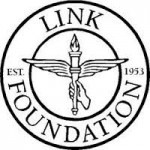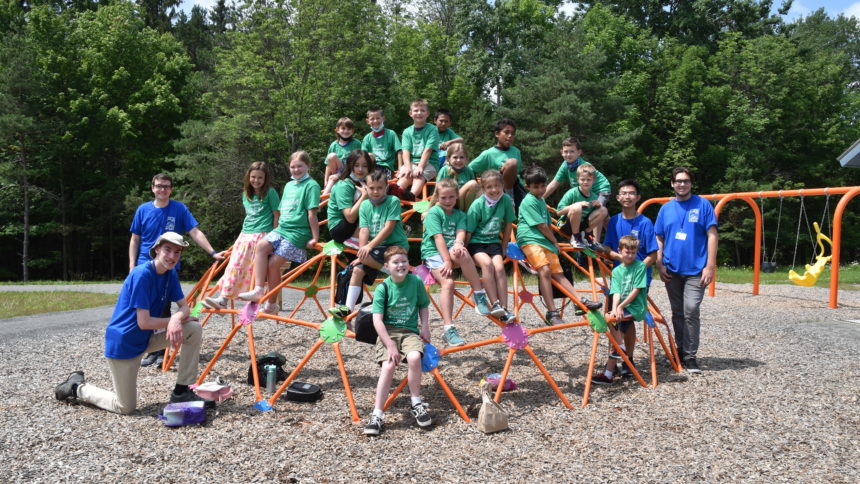Link Summer STEM Exploration information
Camp descriptions, dates, and registration links
Camps for students who will be entering grades 2 – 12 for the 2025 – 2026 school year
 For the 33rd summer, the Kopernik Observatory & Science Center in Vestal, NY is offering weeklong camps for students entering grades 2-12 for the 2025/26 school year. Sponsored by the Link Foundation, in memory of inventor/explorer Edwin A. Link, the Link Summer STEM Exploration camps offer hands-on, high-tech adventures in science, technology, engineering, and math (STEM) in a fun and nurturing environment. Camps run Monday to Friday from 9 a.m. to 3 p.m. Early drop-off and late pick-up options are available.
For the 33rd summer, the Kopernik Observatory & Science Center in Vestal, NY is offering weeklong camps for students entering grades 2-12 for the 2025/26 school year. Sponsored by the Link Foundation, in memory of inventor/explorer Edwin A. Link, the Link Summer STEM Exploration camps offer hands-on, high-tech adventures in science, technology, engineering, and math (STEM) in a fun and nurturing environment. Camps run Monday to Friday from 9 a.m. to 3 p.m. Early drop-off and late pick-up options are available.
The Kopernik Observatory & Science Center is a great place for students to explore the world around them. Students will have their eyes opened and may get their hands wet and feet muddy as they spend time outdoors each day for field exploration and playtime. They will make friends and lasting memories, too!
KOSC Summer Camp Registration Basics:
- Camps have a maximum enrollment and many fill quickly each year. Register early and avoid the waiting list.
- Early Bird Tuition cost is good through May 31. Add $25 when registering after May 31.
- Early drop off (8 am) and late pick up (4 pm) are available for a $15/day. This can be added during initial registration or closer to the camp’s start date.
- Refunds are available (less a $15 administration fee) if a student withdraws 14 days prior to the start of camp. In case of cancellation due to insufficient enrollment, participants will be notified one week in advance and will receive a full refund.
- At checkout, there is an option to pay by check, if preferred. When sending a check, please make it out to Kopernik Observatory & Science Center and include a note specifying where the funds should be applied (especially for those registering for multiple camps). Checks must be sent to Kopernik at the time of registration and pay for the camp in full. Please contact Kopernik directly with questions or concerns.
- A welcome email will be sent approximately one week before the first day of camp providing specifics on the class and a letter from the teacher.
Registration is Now Open
Click Here to Access Our Online Registration Site
Camps for students entering grades 2 & 3 this September
Young Engineers (STEM, students entering grades 2 & 3)
June 30 – July 3 (Session A) – 2 SPOTS REMAINING & July 21 – 25 (Session B) – 6 SPOTS REMAINING
Students become young engineers as they explore the extraordinary world of technology, science, and engineering around them. Engineering connects to everything in our lives from planning a city to using computers to space travel. Using the NASA engineering design process, young engineers in this camp will take on exciting design challenges. Can they harness the wind? Can they design a car? Projects throughout the week will actively engage these young engineers in ways that inspire and excite their imaginations!
Super Scientists (STEM, students entering grades 2 & 3)
July 7 – 11 – 6 SPOTS REMAINING
Get ready for an exciting adventure at our Super Scientists Summer Camp! We’ll dive into the world of amazing scientists and explore the incredible things they’ve discovered. You’ll become a “junior scientist” as you learn about famous inventors, explorers, and trailblazers. Each day, we’ll do hands-on experiments and fun activities that show how these scientists changed the world. From creating your own inventions to studying the environment, you’ll learn how curiosity, creativity, and hard work helped these scientists make incredible discoveries.
Camps for students entering grades 4 & 5 this September
Engineering for Kids! (Engineering, students entering grades 4 & 5)
July 7 – 11 (Session A) & July 21 – 25 (Session B)
Participants in this camp will be introduced to the wonderful world of Engineering. Each day the focus be will on a different field of engineering: mechanical, civil, environmental, aerospace, and computer. Students will employ the Engineering Design Process as they design, build, and invent creative solutions to many interesting problems. Camp members will also work together to build a Rube Goldberg Machine as a culminating activity.
Solar System Travels (Astronomy, students entering grades 4 & 5)
July 14 – 18 (Session A) July 28 – August 1 (Session B)
During this week, students will explore our solar system, learning about different planets and moons, with a focus on Mars, Jupiter, Saturn, and beyond. Through a variety of hands-on activities, they will construct models, analyze rocks and minerals, map a planet’s oceans, and even invent imaginary sea creatures that could live in those waters. They’ll also drill for layers in a Mars cookie! Additionally, students will have the unique opportunity to interact with a NASA scientist via Zoom to learn about their career and research. Tuition includes a $10 materials fee.
Super Kids! Help Save The Planet! (Life Science, students entering grades 4 & 5)
August 4 – 8
Participants in this camp will learn why it’s important to preserve and conserve our Earth’s natural resources. Each day students will discover ways they can have a positive effect and determine ways to help save our environment. Some activities will include: designing their own reusable canvas bag, building a bee condo to help save the bees, tending to our Kopernik Pollinator Garden, learning how to stop plastic pollution, and building solar and hydro energy projects.
Discovering the Beauty of Patterns through Art (Life Science, students entering grades 4 & 5)
August 11 – 15 – 6 SPOTS REMAINING
This camp session will explore the intersections of math and art through patterns, symmetry, sequencing, geometry, and more. We will create and examine works of art to discover beauty through visual order. Each day will be a new creative adventure in media with explorations of paper, beads, weaving, sculpture, printmaking, painting, and more! Bring your art apron and get ready to think logically like an artist.
Camps for students entering grades 6 – 8 this September
Astrobiology: Looking for Life Beyond Earth (Life Science, students entering grades 6 – 8)
June 30 – July 3 – 1 SPOT REMAINING
Is there life somewhere else in our galaxy, or elsewhere in the universe? How would we recognize whether an exoplanet can or does support life? What might that life look like? We will begin by understanding where we find life on Earth, and how we identify it. So far, Earth has the only life that we know of. When we study life, including microbial life, and how it has transformed our world, we learn what other worlds may be like. And, in studying the amazing variety of life on Earth we at least have a starting point for looking for life elsewhere. Together we will explore the age-old question: Are we alone?
Immersive Innovators (Technology, students entering grades 6 – 8)
July 14 – 18 (Session A) -CAMP IS SOLD OUT & August 4 – 8 (Session B) -CAMP IS SOLD OUT
Transport to a development environment beyond the limits of reality as an Immersive Innovator! In this virtual reality (VR) focused camp, students will use VR creation tools to design immersive worlds. They will learn the basics of modern VR development, building experiences not only on a computer, but also through the lenses of a Meta Quest 3 headset! Campers will gain programming and 3D-modeling experience as they build their virtual world—one limited only by what can be imagined! Each day of camp will also offer the chance to try out state-of-the-art VR applications, including the VR version of the acclaimed planetarium simulator, Stellarium. Whether a student participated in last year’s Virtual Universe camp or they’re just starting to explore virtual reality, this camp is great for all skill levels.
CADventures in 3D (Engineering, students entering grades 6 – 8)
July 28 – August 1 -CAMP IS SOLD OUT
Are you a middle school student interested in creating three-dimensional models using computer software? This workshop is for you! CADventures in 3D is an introduction to computer-based engineering. Students learn to create and manipulate 3D models using Onshape. Students will have an opportunity to experiment with 3D printing using models created with Onshape.
Rocks, Minerals & Gemstones (STEM, students entering grades 6 – 8)
August 18 – 22
Budding Geologists will learn about petrology (the study of rocks) and make jewelry in this art-meets-science workshop. Students will learn about different rock types and the minerals that compose them. They will use Kopernik’s special polarizing microscope to see how light passes through different kinds of rocks. They also will learn about precious gemstones found in different parts of the world and create their own earrings, necklaces, and ornaments. Tuition includes $20 materials fee.
Camps for students entering grades 8 – 12 this September
Return to the Edge of Space (STEM, students entering grades 8 – 12)
August 11 – 15
Kopernik students have designed, built, launched, and recovered 7 weather balloons that reached altitudes of over 100,000 feet (nearly 20 miles). In the videos they recovered, they saw the sky turn black and water boil at temperatures below freezing in the near vacuum conditions of maximum altitude. This summer, students will have the opportunity to build on the experience of previous camp years and add new experiments using Raspberry Pi computers and GoPro video cameras. The payload is planned to include a slow scan TV and a fast scan TV experiment to transmit pictures back to Earth during the flight. Students will track the balloon’s flight path in real-time, using a beacon equipped with a GPS receiver.


